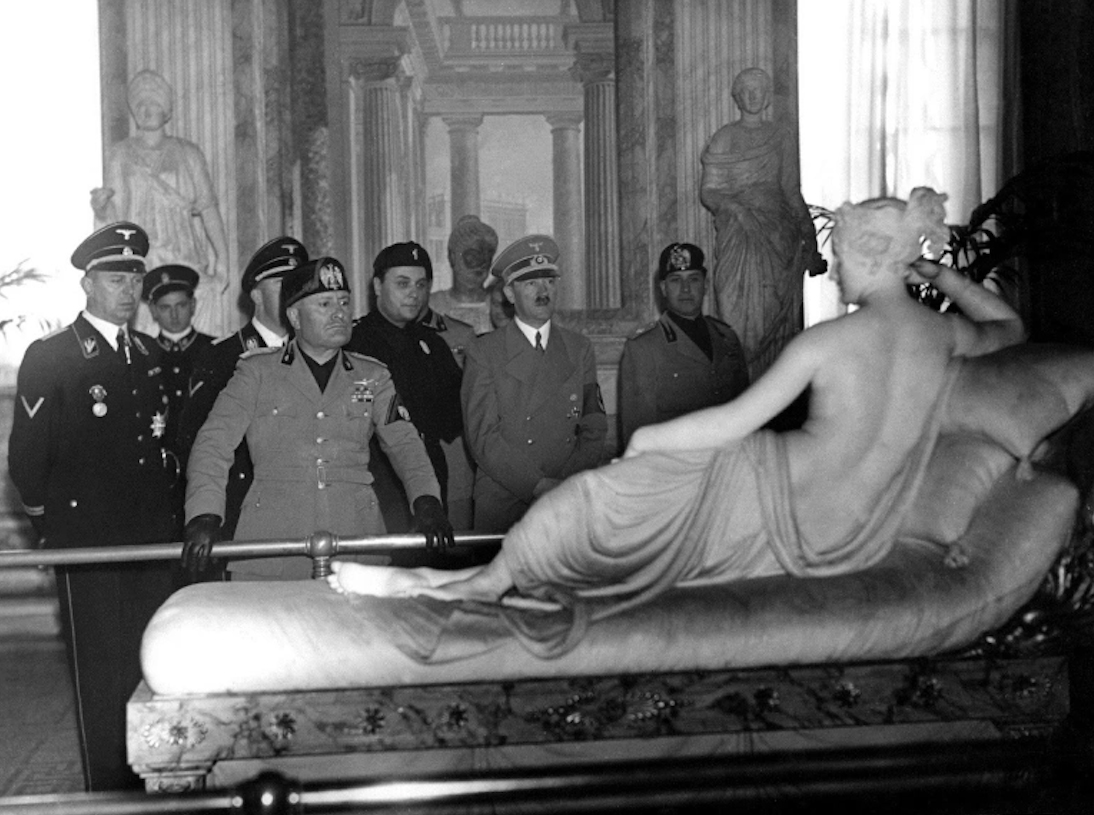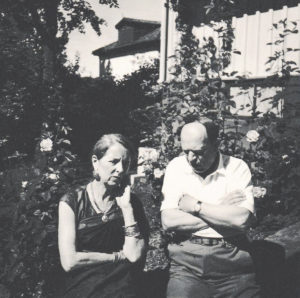[…] the rapid disappearance of the sense of the sacred, the resurgence of the technical spirit and, above all, the disordered proliferation of man in inverse proportion to his quality. Also, while knowing that they could only be, in the name of Christian anthropocentrism, his worst adversaries, Adolf Hitler was careful not to attack the churches openly, let alone persecute them.
He did so out of political skill, and also out of fear of depriving the people of an existing faith before another had penetrated deeply enough into their souls to replace it advantageously. This didn’t prevent him from observing that the lifespan of Christianity was over; that the Churches represented nothing more than a ‘hollow, fragile and deceptive religious apparatus’[1] which wasn’t even worth demolishing from the outside since from the inside it was already crumbling. He didn’t believe in a resurrection of the Christian faith. In the German countryside Christianity had always been a veneer, a shell which had kept intact the old piety under it. And it was now a question of reviving and directing the old piety. In the urban masses he saw nothing that revealed any awareness of the sacred. He realised that ‘where everything is dead nothing can be relighted.’[2]
In any case, Christianity was, in his eyes as in ours, nothing but a foreign religion imposed on the Germanic peoples, and fundamentally opposed to their genius. Adolf Hitler despised those men who had been able for so long to content themselves with such childishness as those that the Churches taught the masses. And he was never short of sarcasm when, before those few to whom he knew intimately, he could confess the least popular aspect of his thinking. He spoke of Christianity as ‘an invention of sick brains.’[3]
What he reproached most of all was the fact that Christianity alienated his followers from Nature, that it inculcated in them a contempt for the body and, above all, presented itself to them as the consoling religion par excellence: the religion of the afflicted; of those who are ‘toiled over and burdened’ and don’t have the strength to bear their burden courageously, of those who cannot come to terms with the idea of not seeing their beloved ones again in a naïvely human Hereafter.
Like Nietzsche, he found it to have a whining, servile rotundity about it and considered Christianity inferior to even the most primitive mythologies, which at least integrate man into the cosmos. Inferior to a religion of Nature, ancestors and heroes, he liked to evoke the beauty of the attitude of his followers who, free of hope as well as fear, carried out the most dangerous tasks with detachment. ‘I have,’ he said on December 13, 1941 in the presence of Dr Goebbels, Alfred Rosenberg, Terboven and others, ‘six SS divisions composed of men who are indifferent in matters of religion. This doesn’t prevent them from going to their deaths with a serene soul.’[4]
Here, ‘indifference in matters of religion’ just means indifference to Christianity and, perhaps, to all religious exotericism; certainly not indifference to the sacred. Quite the contrary! Because what the Führer reproached Christianity, and no doubt any religion or philosophy centred on the ‘too human,’ was precisely the absence in it of true piety.
What he reproached them for was their inability to make the sacred penetrate Life, all Life, as in traditional societies. And what he wanted—and, as I shall soon try to show, the SS must have had a great role to play here—was a gradual return of the consciousness of the sacred, at various levels, in all strata of the population. Not a more or less artificial resurgence of the cult of Wotan and Thor (the Divine never assumes again, in the eyes of men, the forms it once abandoned) but a return of Germany and the Germanic world in general, to Tradition, grasped in the Nordic manner in the spirit of the old sagas including those which, like the legend of Parsifal, preserved, under Christian outward appearances, the unchanged values of the race and the imprint of eternal values in the collective unconscious of the race.
He wanted to restore to the German peasant ‘the direct and mysterious apprehension of Nature, the instinctive contact, the communion with the Spirit of the Earth.’ He wanted to scrape off ‘the Christian varnish’ and restore in him ‘the religion of the race.’[5] And, little by little, especially in the immense new ‘living space’ that he dreamed of conquering in the East, to remake from the mass of his people a free peasant-warrior people, as in the old days when the immemorial Odalrecht, the oldest Germanic customary law, regulated the relations of men with each other and their chiefs. It was from the countryside which he knew still lived on, behind a vain set of Christian names and gestures, pagan beliefs from which he intended one day to evangelise the masses in the big cities: the first victims of modern life in whom, in his own words, ‘everything was dead.’
This ‘everything’ meant for him the essential: the capacity of man and especially of the pure-blooded Aryan, to feel both his nothingness as an isolated individual and his immortality as the repository of the virtues of his race. He wanted to restore this sense of the sacred to every German—to every Aryan—in whom it had faded or had been lost over the generations through the superstitions spread by the churches as well as by an increasingly popularised pseudoscience. He knew that this was an arduous and long-term task from which one couldn’t expect spectacular success, but whose preservation of pure blood was the sine qua non of accomplishment because, beyond a certain degree of miscegenation (which is very quickly reached), a people is no longer the same people.
_____________
[1] Rauschning: Hitler m’a dit (op. cit.), p. 69.
[2] Ibid. p. 71.
[3] Libres propos sur la Guerre et la Paix (op. cit.), p. 141.
[4] Ibid., p. 140.
[5] Rauschning: Hitler m’a dit, p. 71.








